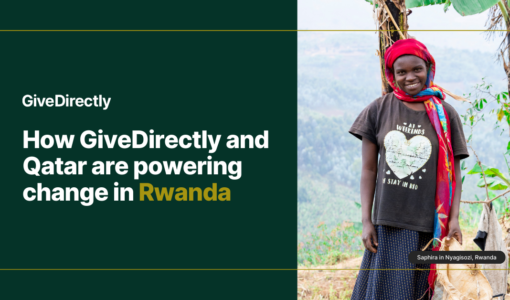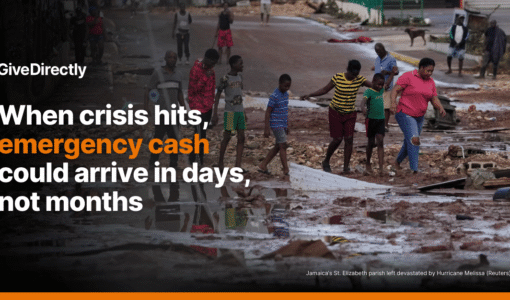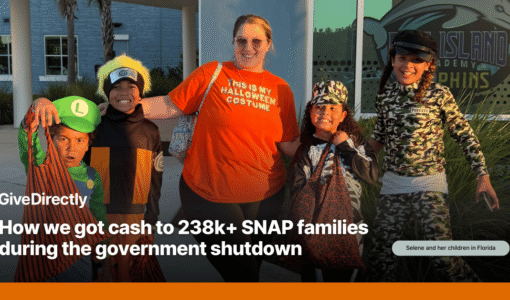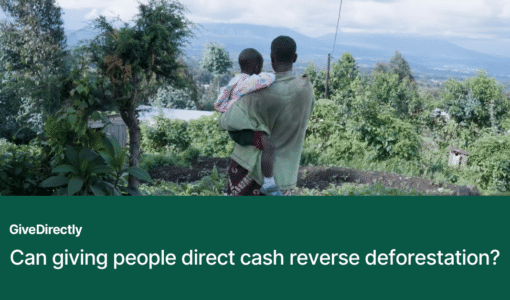Last October we began sending monthly universal basic income (UBI) payments to 95 people living in a rural village in Western Kenya.
While people in 200 villages will eventually receive cash transfers as part of our test of a UBI, we wanted to begin with a one-village pilot. Doing so allows us to test and resolve a number of operational questions we had, as well as to have more in depth conversations with UBI recipients than would be feasible during the full study.
Below we summarize participants’ responses to surveys collected as part of our call center-based follow-up process, as well as small focus group conversations we conducted. We’ve picked out quotes to highlight some of the key themes, but you can read the raw responses to all questions here. You can also read the reflections of an independent journalist, Annie Lowrey of the New York Times Magazine, who visited the village.
What it’s like to receive a basic income
Basic income tackles poverty directly: before we began the payments, many people in the village were living on less than $0.75 a day; afterwards, no one was. For 45% of the village’s residents, the first month’s basic income payment was the largest amount of money they’d ever had. 60% of recipients had never had more than two month’s worth of payments at one time.
We asked basic income recipients to describe the biggest difference the money has made in their daily lives. Below is some of what they had to say:
- “I can have 3 meals in a day.” Dorcus, 87.
- “I have been able to add capital to my business and increase the stock. This has increased my sales and improved my profits.” Irene, 23.
- “I will be getting transfers that will enable me to pay medical bills for my condition and also buy other things. Since I went for check up after receiving the transfer, my health situation has improved and I am able to go about my business without much stress.” Grace, 68.
Asked how the basic income affects how people interact with their spouses and family they said:
- “The burden of catering for all household expenses has been taken off from just one person and we are happy that everyone contributes in the family” Alice, 73 .
- “My son now is less stressed about me going hungry because I will get money to buy food in case he fails to send me money.” Dorcus, 87.
- “Receiving money from GiveDirectly has changed my interaction especially with my spouse because we can sit down discuss how we will use the money unlike before where at times I could come home with no money from the casual jobs hence nothing to discuss.” Denis, 36.
How did the basic income get spent?
Cash transfers enable recipients to use the money to meet a diverse set of needs and desires. That point is clear when we see how the residents of our basic income program spent their first transfers:
- “I spent the entire transfer received from GiveDirectly to purchase a fishing net and a floater.” Erick, 40.
- “I spent the money received from GiveDirectly to buy clean water, food, soap, and used most of the amount to pay school fees.” Fredrick, 70.
- “I spent most of the money I received from GiveDirectly on buying a goat since I want to buy livestock. I also bought food for my household.” Patrick, 38.
- “I spent the money received from GiveDirectly to purchase food and kept most of the transfer as savings.” Milka, 44.
About 81% of respondents planned to save some of the funds to use later. Of those saving, most plan to use something called “table banking,” creating a group with other recipients where members will contribute a portion of their regular transfer and one member will receive the full sum each month. Focus group respondents estimated that residents have started three of these groups so far. About 40% plan to save through their mobile money M-Pesa accounts or through M-Shwari, an interest-earning mobile bank account connected to M-Pesa.
The people who chose not to save right now had pretty understandable reasons for doing so. They wanted to buy things to meet needs or plans that were important immediately. Here’s what one woman said in the women’s focus group:
- “I have not started because that is the only money that I receive. So I get when I lack a lot of things. So when I receive I go straight away to the market to buy the things that I do not have. I then buy the things that I lack. So, I will be truthful. That is the reason why I have not started saving. I desire to save like the rest, but the money is little and sometimes I have debts and I need many things.”
For the people who are focused on saving, their savings and plans are as varied as the spending they’ve already carried out:
- “I am planning to make a new and proper greenhouse. I have some that I have constructed using polythene but the wind is too much and destroys them. So I want one made of metals and covered with nets. We have so much wind from the lake that destroys the ones that I currently have. So I want to construct a better one.” Respondent in women’s focus group explaining her investment plan.
- “I want to pay school fees for my child who is to join secondary school in 2018.” David, 40.
- “I want to repair the house that my children spend their nights in, since it is leaking and has dilapidated walls.” Jane, 52.
- “What we would wish to see is to have everyone owning something that they look up to. In this case we are targeting that everyone in the group will be owning a cow.” Respondent in women’s focus group explaining what they intend to do in the future with the savings in their group.
We wondered whether community members would put portions of their transfers towards shared projects like building a well or improving the roads. When we first explained the program, one of the community leaders suggested this at the village meeting, and it’s obviously on people’s minds, but we haven’t yet seen any large projects launched as a result.
- “We just started receiving this cash just the other day and after doing a few things with it in the house here, we can think of coming together as a village and we agree that we pool some cash together that we can use to do something, at the moment we have not started, but we will.” Focus group respondent.
- “For us in [village name redacted], we have a group and we do meet frequently and contribute 100 KES each so this money came when we already have existing groups like if you come here on 28th of this month, you will meet all the [village name redacted] residents in the school here and we also have our chairman and treasurer here.” Focus group respondent.
Do recipients of a basic income stop working?
Basic income critics fear that the sky may fall, people will stop working, and as the Economist argued, “large segments of society could drift into an alienated idleness.” The evidence on cash transfers in general shows that cash transfer recipients don’t stop working or spend the money on alcohol. Still, the question of how basic income will affect how people spend their time is an important part of the debate, and will be a priority for the randomized control trial.
We asked UBI recipients themselves whether receiving the payments changed how much they feel like they need or want to work. Here’s what they said:
- “I feel I need to work harder and engage in other income-generating activities to get more money.” Samson, 70.
- “Yes, receiving the payments has changed my feeling towards work since I really want to finish my driving course and immediately look for employment.” Fredrick Odhiambo Awino, 28.
- “I will not be working since I am old and sickly. I will just wait for the transfers.” Jael, 73.
- “I will still continue with my small business and charcoal burning since the family needs the extra income to enable us meet all our expenses without borrowing from relatives each time.” Norah, 30.
- “I will continue with my charcoal burning business and also doing casual jobs in people’s farms so that I can always have some money to cater for my needs before the next transfer.” Joyce, 58.
A related question is how the money will affect recipients’ decisions or attitudes around entrepreneurship or other risk taking, like migrating to look for work. So far, seven recipients have indicated that they had plans to or had left the village to look for some form of work. On entrepreneurship, some recipients plan to use the cash transfers to expand existing businesses or start new ones, while others think they haven’t received enough money to start anything meaningful.
- “I used to be a shoemaker but I don’t do it at the moment because I don’t have a site, but now with GD I can buy the materials I need to revive the business.” Mixed gender focus group respondent.
- “There is a time I was selling maize, buying and selling but it collapsed but for now I know I will revive it because during that time we had a drought and so we consumed the maize.” Mixed gender focus group respondent.
- “I want to start a small ‘omena’ (small fish) business.” Caroline, 28.
- “I want to start a second-hand clothes selling business.” Millicent, 33.
- “Personally, I desire to start a business but it’s not easy to start one here. For example, if we do the same business, it gets difficult to get customers. We have to fight for the few that are available. We are not able to do business in far places. If you start one you can only do it within the village next to your house. Getting the capital is also difficult but we would wish to start businesses.” Women’s focus group respondent.
How do payments for individuals differ from payments for households?
Usually, GiveDirectly gives only one cash transfer per household, and whomever is labeled the recipient is asked to make decisions on how to spend the money with the rest of their household. For the basic income program, we planned to send transfers to each adult individually, so we were curious how this would be perceived in the community. On the one hand, an individually-targeted safety net may help support individual risk-taking decisions or help someone escape an abusive spouse. But we were also worried people might think GiveDirectly is trying to break apart families.
We asked recipients why they thought we were giving payments to individuals and whether it was a problem that we were doing so:
- “GiveDirectly gives out money to individuals and not households because they believe that different people have got different needs and they will definitely use the money to buy different items.” Bentah, 27.
- “GiveDirectly gives out transfers to individuals and not households because they believe that people have different needs like women prioritize food for the family but men prioritize development projects.” Erick, 39.
- “I believe that GiveDirectly gives transfers to individuals so as to avoid conflicts in the family.” Fredrick, 28.
Do people trust that the payments will continue for 12 years?
Whether our study is a good reflection of how a scaled-up UBI policy would work depends a lot on whether people trust us that the payments will continue for the full 12 years. We’ll use a number of strategies to build credibility (e.g. maybe remind them of remaining payments in each follow-up call), but we also wanted to use the pilot to see where we stood.
When we asked, 94% of recipients said they trust the payments will continue for the full 12 years:
- “This has really given me hope and I can now plan for the future.” Mary, 39.
- “Believing that payments will be given for that long has given me the confidence to continue keeping my savings in the table banking and now I am sure that I will pay every month without failure.” Mary, 60.
- “I now feel positive with life because I can plan to have things I don’t have in the future.” Saline, 39.
Is it fair that everyone receives the same amount?
One question we had that mirrors a broader social question about UBI is whether having everyone receive the same amount, regardless of how much money they already have, would seem unfair. Recipients say that having everybody receive payments helps keep the peace, and is actually more fair.
- “Now you see, just keep up the way you had started sending transfers in [village name redacted], if you bring this other model where you leave me out and include someone else, you again remove someone and include another, we will not live in peace, there will be fights and strife among us, so just keep on with this our model.” Focus group respondent.
- “Another thing is that money is never enough. Even those whom we think have enough still go ahead to look for money. So, people do not get to have enough. You might think he lives well that he does not need more. But people have to eat daily. So then, everybody needs to be given the transfers. It depends with one’s budget. You will still need to look for money. If you give to just one person in the house, then there will be conflicts. People will fight.” Women’s focus group respondent.
What’s next?
Thousands of partners have joined us in funding this exciting project, but we are continuing to fundraise to close the gap and launch the full study this year. Join us and follow along here as we learn more.
***
Joe Huston is a Regional Director at GiveDirectly and Caroline Teti is a Field Director at GiveDirectly. Both are leading the basic income experiment.



